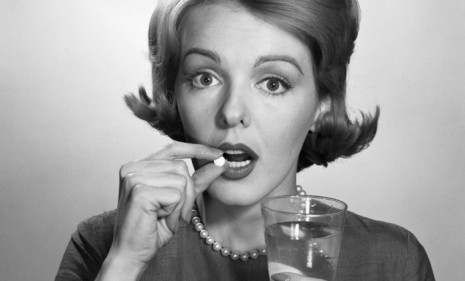Is the 'female Viagra' a myth?
The FDA is skeptical about flibanserin, a drug heralded as a potential cure for a lackluster female sex drive. Why?

A free daily email with the biggest news stories of the day – and the best features from TheWeek.com
You are now subscribed
Your newsletter sign-up was successful
The future of the so-called female Viagra is in doubt — federal regulators now say it doesn't really improve sex drive in women. But the German company that is producing the drug, flibanserin, still says it's an effective treament for hypoactive sexual desire disorder (HSDD), a condition marked by a lack of sexual desire over an extended period of time. How is the "pink pill" supposed to work — and why is the Food and Drug Administration skeptical? (Watch a CBS report about the "Female Viagra".)
Does flibanserin function like Viagra?
Not at all. Viagra works by increasing bloodflow to the penis, causing the male erection. Flibanserin (and other drugs in the works to help stimulate female desire) aim to alleviate the psychological roots of flagging desire. Some of the drugs manipulate testosterone levels in the female body, but flibanserin — originally marketed as an anti-depressant — works to reduce levels of serotonin, which can blunt desire, and increase the flow of dopamine and norepinephrine, which improve desire.
The Week
Escape your echo chamber. Get the facts behind the news, plus analysis from multiple perspectives.

Sign up for The Week's Free Newsletters
From our morning news briefing to a weekly Good News Newsletter, get the best of The Week delivered directly to your inbox.
From our morning news briefing to a weekly Good News Newsletter, get the best of The Week delivered directly to your inbox.
Are there studies suggesting flibanserin works?
Yes. Up until now, research on the drug was encouraging. A May 2010 study showed that of 1,378 women diagnosed with HSDD, those given flibanserin showed a 50 percent increase in "sexually satisfying events" after taking the drug for one month.
Why aren't regulators sold?
The "overall response rate" to flibanserin treatment "is not particularly compelling," according to an FDA staff review, given the comparatively high percent of users (15 percent) who experienced harmful side effects, including dizziness, nausea, anxiety, insomnia, depression, and fainting.
A free daily email with the biggest news stories of the day – and the best features from TheWeek.com
When does the FDA make its final decision on the drug?
The German drugmaker, Boehringer Ingelheim, will defend it again on Friday, when a panel of experts will consider whether to recommend approval by the FDA. But even if the drug is passed, women shouldn't be looking for a Viagra-like cure on the shelves any time soon: "We ladies are complicated," June Reinisch, senior research fellow at the Kinsey Institute for Research in Sex, told ABC News. "It may be the first step in something interesting, but to call it a female Viagra, we are getting way ahead of ourselves."
Sources: ABC News, US News & World Report, Time, Wall Street Journal, NY Times
-
 The ‘ravenous’ demand for Cornish minerals
The ‘ravenous’ demand for Cornish mineralsUnder the Radar Growing need for critical minerals to power tech has intensified ‘appetite’ for lithium, which could be a ‘huge boon’ for local economy
-
 Why are election experts taking Trump’s midterm threats seriously?
Why are election experts taking Trump’s midterm threats seriously?IN THE SPOTLIGHT As the president muses about polling place deployments and a centralized electoral system aimed at one-party control, lawmakers are taking this administration at its word
-
 ‘Restaurateurs have become millionaires’
‘Restaurateurs have become millionaires’Instant Opinion Opinion, comment and editorials of the day